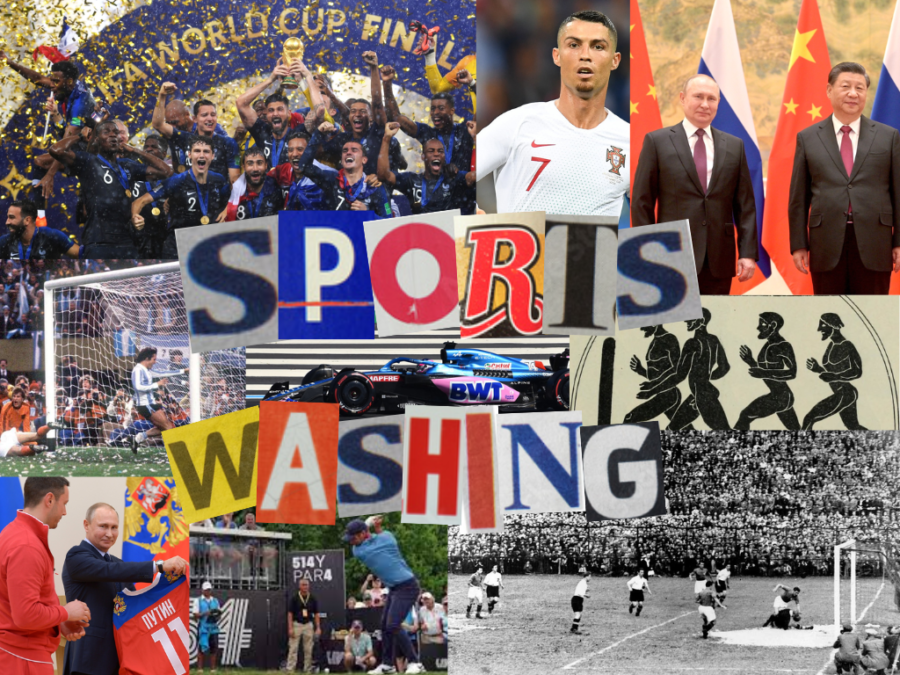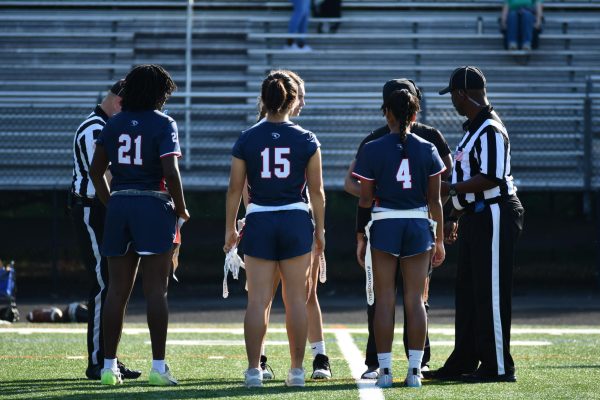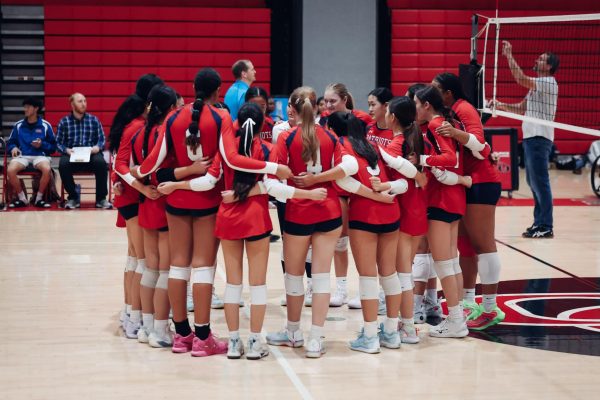The dangerous game of sportswashing
The term sportswashing describes a government using high-profile sports events in order to cover up an ongoing issue within their country. This issue most recently came to light after the 2022 FIFA World Cup in Qatar. Qatar is located in the Middle East and is notorious for its offensive human rights record, particularly regarding migrant workers and women. In Qatar, a guardianship system is in place, making it nearly impossible for women to make any decisions without the input of a male guardian. Qatar also has serious crime sentences for ‘sodomy’ or same-sex contact. Most notably, their treatment of migrant workers has come under fire.
Before the 2022 World Cup, thousands of workers came to Qatar from Nepal and other countries for construction jobs building the stadiums and infrastructure needed to host a World Cup. The workers who came to Qatar were forced to work long hours in Qatar’s extreme heat and faced widespread wage thefts. Many workers died throughout the 12-year process, with their families unable to collect benefits. The government declared many workers’ deaths to natural causes, leaving the families of these workers helpless.
As the start of the World Cup neared last year, more news outlets started to report on the human rights violations plaguing Qatar. This also highlighted more of Qatar’s restrictions on free speech and assembly. Throughout the World Cup, some teams and players also made political statements. Harry Kane, captain of the English team and Gareth Bale, captain for Wales, both presented the idea of wearing ‘OneLove’ armbands, in protest of the repression LGBTQ+ people face in Qatar. However, that was rejected by FIFA and replaced with ‘No Discrimination’ armbands. As the World Cup progressed, the talk of Qatar’s human rights record died down.
The migrant workers who created the stadiums, hotels and practice fields were pretty much forgotten, and their families have received no indication of help from FIFA or the Qatair government. This situation was a clear example of how the Qatari government was able to use a globally unifying factor (such as soccer) to take notice away from the deeper issues within their country.
While this is the most recent example of sportswashing, it is far from the first. There are examples in every sport and century, each having a unique impact on history. Notably, in 1936 the Olympics were held in Berlin, Germany. For context, in Germany at the time, Adolf Hitler and the Nazi regime were in control of Germany, and had started efforts to separate German Jews from the rest of German society. By the Olympics, Hitler had completely obliterated the last of the agreements in the Treaty of Versailles, after his re-militarization of the Rhineland (land in Western Germany by the French border). No other nations stopped him from taking this action.
Due to this, there were attempts by multiple countries to stop the Olympics from going ahead in Germany but the protests failed. The 49 nations that did send teams to Berlin that summer legitimized the actions of the German government and Hitler. Unbeknownst to most journalists, Hitler’s Minister of Propaganda Joseph Goebbels had ordered all anti-Jewish signs and symbols to be taken down and newspapers to tone down their rhetoric against Jews. This helped present a false, clean image of Germany to visiting athletes, spectators and journalists.
The propaganda that Germany employed during this period helped convince foreign nations that Germany was thriving, and even lessened people’s doubts about the rumors of antisemitism in Germany. “Most newspaper accounts echoed the New York Times report that the Games put Germany ‘back in the fold of nations,’ and even made the Germans ‘more human again.’ Some even found reason to hope that this peaceable interlude would endure,” the US Holocaust Memorial Museum wrote.
However, the moment the Olympics ended, persecution of Jews resumed. Two days after they ended, the Jewish head of the Olympic Village killed himself after being removed from the military because of his religion. Just three years later in 1939, the same German government that had portrayed themselves as ‘peaceful’ and ‘accepting’ invaded Poland, starting World War II and the genocide of six million Jews. By using sports, which are globally understood and connecting, Hitler was able to glorify Germany and cover up what his government was doing behind the scenes.
Another major example of dictators’ sportswashing is Vladimir Putin. Throughout his reign, multiple sports competitions have been held in Russia, a large part of his own propaganda efforts. The 2018 World Cup, 2014 Olympics and 10 Formula 1 Sochi Grand Prixes have all been held in Russia. Putin has used sports for years as a way to validate his ideologies and portray Russia as a strong world power.
In 2007, Putin delivered a speech attacking the US and rest of the free world, with undertones displaying his intent to return Russia to its former glory. Shortly after this, Russia successfully lobbied the IOC (International Olympic Committee) to hold the 2014 Olympics. The IOC seemed to endorse Putin’s ideas, and made them seem less radical than they were. The IOC made it appear like his ideas belonged on a global stage, and practically gifted Russia a platform to spread any ideas it wanted. It has become increasingly clear in recent years that Putin values sports as a propaganda device, evident in his state-sponsored doping program in order to increase medals for Russia. He has used sport to make Russia seem friendly, welcoming 2018 World Cup athletes to a “‘open and friendly’ Russia,” wrote Sports Illustrated.
Even recently, at the 2022 Olympics, Putin pretended to fall asleep as the Ukrainian delegation entered, and invaded them shortly after. He has exemplified how sports can be weaponized to distract outsiders from commenting on other aspects of a country. Sports are such a universally consumed and loved thing that pretty much any country hosting a major competition will seem powerful and ‘cool,’ which can be extremely dangerous for dictatorial regimes like Russia’s.
Formula 1, the highest level of motorsport, has also come under fire for their sportswashing tactics. They have raced and continue to race in places such as Bahrain, Saudi Arabia and the United Arab Emirates. All of these places have questionable records when it comes to rights for women, speech and gay people. The conversation over F1’s sportswashing reached a high in 2022, during the Jeddah Grand Prix weekend. Jeddah is a city in Saudi Arabia and F1 races at their Jeddah Corniche circuit.
Last year, a group of Yemeni rebels bombed an oil depot seven miles from the track, protesting the Saudi-backed government in Yemen. The FIA, Formula 1’s governing body, opted to continue the practice sessions and races as planned, despite worries from the drivers that it was unsafe to do so. Lewis Hamilton, seven-time world champion and outspoken activist, said that he was prepared to boycott the race if drivers did not get more input on where they raced.
During this year’s race in Jeddah, Hamilton was asked about his concerns over safety. “It’s something I don’t want to get into. So hopefully everyone has a safe weekend and hopefully everyone gets home safe afterwards. That’s as much as we can do,” Hamilton said.
Despite all these recent examples, sports washing can be traced back to the Ancient Greeks, and the first Olympic Games. “There’s a long war between Athens and Sparta. Athens looks like it’s. . . getting the crap beaten out of them. And everyone thinks that they’re down and out. . . So an Athenian politician named Alcibiades comes to the Olympic Games in 416 [B.C.E.], right in the middle of the war, when things are going bad for Athens. And he enters several chariot teams into the four-horse chariot race and wins first, second and either third or fourth place. And that’s like an F1 racing team—it was insanely expensive. And they all said to him at home, ‘You’re crazy. We don’t have those kinds of resources.’ And he’s like, ‘Listen. Everyone thought we were down and out. I win all these events at Olympia, and now everyone in the Greek world thinks that we’re just fine. And they’re terrified of us.’ It was a straight-up geopolitical maneuver,” Paul Christensen, professor of ancient Greek studies at Dartmouth, said.
There are too many examples of sportswashing to list here, but the main issue is how easily it is accepted. So many people around the world take sports seriously, and governments can easily take advantage of that. The amount of value people place in their sports teams of choice makes it easy to manipulate for geopolitical gains. Magicians use the technique of attention management, or misdirection, in order to accomplish their tricks. The logic behind that is if you can hold someone’s attention on a gimmick long enough, they won’t see what’s really going on.
The same way a magician can distract you long enough to figure out your card, corrupt regimes have viewers focus on the newest sports games, not their horrendous human rights records or dictatorial practices. Sportswashing is a wildly effective PR tactic, and won’t be going away any time soon. However, we all have a responsibility to call it out when we see it, and pressure associations to stop selecting reprehensible governments just for financial gains.
Your donation will support the student journalists of Thomas S. Wootton High School. Your contribution will allow us to purchase equipment and cover our annual website hosting costs.
Claire Lenkin is a 2025 graduate.







